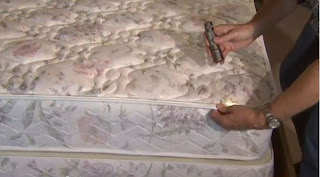
Although we have had reports of bed bugs here in
Lincoln and the rest of Nebraska for years, they have recently been found in
UNL dorm rooms.
Students returning after Christmas break were pretty alarmed by the news. Being I work at UNL, I can't help but also feel uncomfortable that the pests have been found so close to home.
Adult bed bugs are small, brownish flat insects about the size of an apple seed. They prefer human blood but will also feed on other animals, such as household pets. However, despite their obvious "ick" factor, bed bugs are not known to spread any diseases.
Bed bugs are becoming more prevalent in all sorts of places...shoe stores (the
Nike flagship store in New York had issues!), movie theaters, and of course hotels. Multi-unit structures, such as dorms and apartments are especially hard hit since these insects can travel from unit to unit.

So what do we do about this resurging menace? Vigilance is definitely the number one way to protect yourself. When traveling to hotels, always check the room for bed bugs and their feces, especially behind headboards and on the seams of the mattress (and yes, I have personal experience...I once found a bed bug in a hotel room; not only was I moved to another room, but got the night free!).
Keep luggage away from the bed and off the floor--heavily infested rooms may have bugs hiding in numerous places. Storing luggage on a table, dresser, or in the bathtub can be helpful. Avoid luggage racks as there are folds where bed bugs could hide and then hitchhike onto your suitcase.
When you get home, examine your luggage before entering the house and if possible, keep luggage outside in the garage or on the patio for a few days, especially if it is summer. Wash and dry clothes immediately, or at the very least put them in a hot dryer, as the heat will kill bed bugs.

If you suspect an infestation or should find evidence of bed bugs after doing an inspection at home, you can employ some "do-it-yourself" tactics such as vacuuming or using a portable steam cleaner around the bed seams. In addition, you can also install a
homemade bed bug trap and put a bed bug encasement on your box springs to make it more difficult for bed bugs to reach you when you are sleeping.If your bed bug problem is severe, you may wish to bring in a
bed bug sniffing dog to confirm the presence of this pest in hard to see areas, and then call in a pest control company to manage the problem. Pest control companies may use professional heat or steam treatments, or a variety of insecticides, such as crack and crevice treatments.
For more information on preventing bed bugs or managing them if you should have an infestation, visit the following links:
Bed Bug PreventionDealing with Bed BugsManaging Bed BugsUnderstanding and Controlling Bed Bugs





















